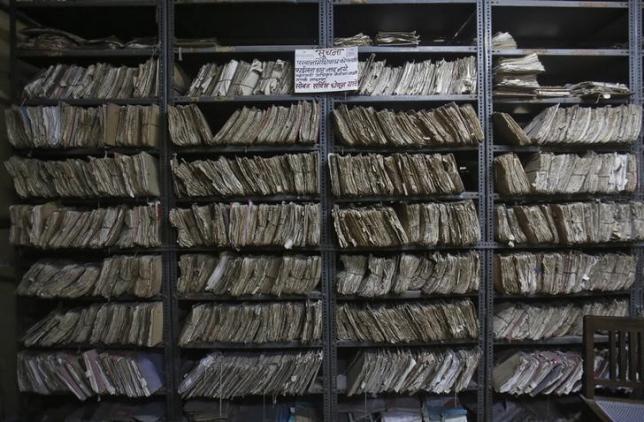People being harassed on pretext of non-traceability of records
Evolve mechanism for timely dissemination of information: SIC
Mohinder Verma
JAMMU, Nov 22: Central Record Rooms of the Revenue Department have not been preserving documents relating to Permanent Resident Certificates (PRCs) in a manner which facilitates retrieval and traceability as and when required thereby harassing the bonafide citizens of the State as well as defeating the objective behind their establishment.
This came to the fore during the proceedings before the State Information Commission (SIC) in a 2nd appeal filed under the provisions of Jammu and Kashmir Right to Information Act, which has been disposed of with the direction to the Commissioner/ Secretary to the Government, Revenue Department to initiate steps so as to avoid harassment of the people by those at the helm of affairs in the Central Record Rooms.
In the 2nd appeal, it was submitted before the State Information Commission by the appellant that Public Information Officer (PIO) in the Central Record Room and First Appellant Authority/Regional Director, Survey and Land Records Jammu had denied him complete record of a PRC case on the pretext of non-traceability.
“The Central Record Rooms have been established with the objective of preserving all important records particularly relating to revenue matters and Permanent Resident Certificates”, the Information Commissioner Mohammad Ashraf Mir said, adding J&K has the unique distinction of having the permanent residence feature for its citizens and there are various special laws in the State which restrict the purchase of immovable property by persons who are not permanent residents of the State and the employment under the State Government is available only to permanent residents.
“The documents relating to grant of Permanent Resident Certificates are of paramount importance but it has been found that those posted in the Central Record Rooms plead non-traceability of records in most of the cases of this nature”, the Commission said, adding “every organization has its own rules for preserving or destroying the old records but the records which are not supposed to be destroyed are sent to the Central Record Rooms of the Revenue Department for preservation as such the organization cannot claim that the records are not traceable”.
The Commission further said, “it is an admitted fact that the record room possess huge amount of old records and at times it could be difficult to find out a particular document or file. But such difficulty cannot absolve the PIO from the responsibility of locating and dissemination of information to the appellant, howsoever, hard it may be”.
“Whenever a person applies for issuance of PRC, he is asked by the revenue authorities to produce revenue records including the PRCs of their parents and grandparents for establishing that he is an offspring or descendent of a permanent resident of the State. However, when the applicant applies for copies of old records, the authorities in the record room tell him that the old records are not traceable”, the Information Commissioner observed.
Stating that Regional Director of Survey and Land Records as well as the competent authorities for grant of PRC are part of the same public authority— Revenue Department of the State, the Commission said, “one arm of the public authority cannot claim non-traceability of old record sought by the other arm of the same public authority”.
Laying stress on issuance of certain guidelines by the public authority to the Directorate of Land Records with respect to making available copies of old revenue documents to the applicants, the Commission said, “the Commissioner/ Secretary to the Government, Revenue Department should intervene so that necessary instructions are issued to the Land Records Organization with respect to preservation and maintenance of old records by such organization in a manner which facilitates retrieval and traceability of such records as and when required”.
About the specific aspect of 2nd appeal, the Commission has directed the Public Information Officer to constitute a team of officials for locating the relevant documents/files relating to information sought by the appellant so that the information required by the appellant is provided to him.
“The PIO shall furnish the compliance report to the Commission within a period of one month from the date of receipt of this order”, the Commissioner further directed.


